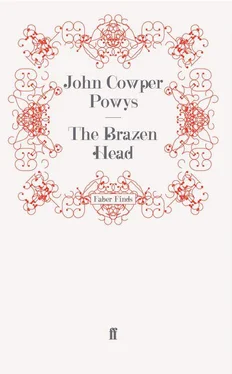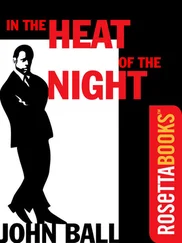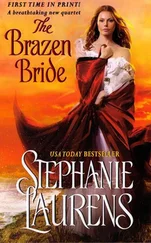It was Albertus Magnus, and he alone, who caught the full significance of this strange conclave, which was partly a human council of war against the caprices of Nature, and partly a parliament of primitive superstitious tribes instinctively fearful of being tricked into mystic slavery to some crafty Khan of Karakorum!
The red-brown jerkins and tunics and breeches, and the red-brown caps with short brown-and-white feathers sticking out in a queerly insolent and defiant manner, either above the wearer’s left ear or above his right ear, according to his individual taste, were drawn up in thick battalions on the two stony ridges in front of the main entrance to Lost Towers.
They were armed with the most deadly-looking weapons, like broad double-edged Roman sword-blades fixed into the massive handles of ordinary hunting spears. It seemed to Albertus that the King’s Men under Perspicax would not have a chance of victory, even though assisted by the wilder and less disciplined retainers from Gone Castle and the Fortress.
But the Cologne teacher had hardly reached this conclusion, with which without doubt most of his efficient and practical friends in that great centre of learning would have entirely agreed, when the sort of unexpected confusion arose such as probably only that particular portion of England in the whole western half of the entire world could have evoked.
The Lord and Lady of Lost Towers were evidently quarrelling between themselves; for the man’s voice and the woman’s voice were clearly audible above the general hoarse murmur and the general jarring chatter.
Presently both their figures, each pushed forward, evidently by their immediate attendants, hers female, and his male, were projected through the red-black lines with their alarming weapons and forced to come forward, though it was evident to everybody that the real force of the emotional feelings of those two was directed, not against the King’s men and not against the mass of men from the Fortress and from Cone, but solely against each other.
But something less personal and much more far-reaching was now beginning to happen. This dangerous disturbance did not — so it seemed to Albertus — have any connection with the quarrel between their Lord and their Lady. It sprang from among a group of serfs, who were clearly setting out to do some autumnal job in the harvest-field and had just been met by similar groups from both the manors of Cone and Roque, who had joined the free followers of their respective lords of the manor out of curiosity rather than local patriotism.
Among these were old Dod Pole, that natural-born rebel, and several of his family, including not only little Bet, his great-granddaughter, but also his granddaughter Oona, or Una as many people called her, with whom — at least so we overheard the impulsive young John declare — his brother Tilton was in love.
These serfs, tagging along with the Fortress and Cone people, had quickly become the noisiest among their whole dramatic crowd, and talking earnestly among them by this time was none other than the outlandish figure of Spardo, mounted on his horse Cheiron, at the sight of whom, as it may be well believed, the father of Tilton and young John felt some rather odd feelings!
And not only at the sight of that pair was it Sir Mort’s destiny, that fine morning, to suffer curious sensations; for lo and behold! before his very eyes, only sufficiently far away for him not to have to undergo any immediate responsibility — and what in the devil’s name had brought them here? — were all his own family except Lady Val herself! There they all were: John so dark and slight and eager, Tilton so massively tall and fair and impassive, yes! and even Lil-Umbra herself, on horseback as usual — how that wench did love riding! — and her wise and tactful knight from Laon on horseback at her side.
Thank the gods, yes! His daughter was certainly like himself and knew sound wood from rotten wood! Would he never be able to make Valentia more sensible? The egoism of Sir Mort was so profoundly self-centred that it never entered his head to ask of destiny the obvious question — how it was that, just on this critical day and at this crucial hour when the Master and the Mistress of Lost Towers, having exhausted their verbal artillery, had become a pair of motley antagonists, wrestling in the midst of their red-brown retainers, all the whole neighbourhood supported by the enterprising Perspicax with the King’s Men should have appeared on the scene to witness the victory of defeat of one or other of these sad, mad, and absurdly fantastic persons!
But the really scrupulous historian of the reckless and quite crazy doings of all of us mortal men will have made a shrewd guess already as to the particular cause of this queer concatenation.
“O how wonderful,” said Petrus Peregrinus to himself, “how wonderful, O how far beyond all I have ever hoped or imagined or dreamed could happen to me, to actually be selected by”—he was going to utter the word “Providence” but just stopped himself in time! — “by Destiny, to be the Antichrist himself, the real, actual, historic person predicted by every prophet who ever prophesied from the foundation of the world!”
Deep into the top-curve of the bony arch between his belly and his thighs, and just above his generative organs, Petrus had dug the blunt, thick, staring-eyed cranium of the demonic lodestone he persisted in calling “Little Pretty”, and while he dug it into himself, he had summoned into his presence every living person old or young, male or female, he had ever met or ever heard of in that district.
“I’ll have your false heart out of you!” cried the Lady of Lost Towers.
“I’ll tear the devil’s-dam tongue out of your hell’s throat for you!” cried the Lord of Lost Towers.
And then, before either Bonaventura in his grey robe or Albertus in his black robe could force a passage through the red-brown mêlée, some devoted adherent of the mistress of the Castle smashed the master’s skull with a heavy stone, and some furious armour-bearer of the murdered Maldung knelt on the lady and strangled her to death with his two hands, before his own head was severed from his crouching body and all three corpses were soaked in his blood.
For several seconds there was a ghastly hush after this, as if over that whole worked-up mass of human creatures an enormous dark feather had fallen from the Empyrean, a feather struck from the wing of the Eagle of Zeus by the lightning-swift descent of some falling star.
Then the whole company of serfs who were present — those who had been following old Dod Pole, their one revolutionary mouth-piece, as well as those who were on their way to their labour in the fields — moved instinctively forward, while Dod Pole himself, leaping up from their midst upon the marble pedestal of the broken and prostrate figure of some forgotten Roman ruler, almost hidden now under yellow moss and white lichen and tiny ferns, began an exultant threnody over all the deaths of all the wrongful owners of a planet that should be owned in common by all mankind.
“I call upon you, my brothers and fellow workers,” cried old Dod Pole, in that trumpet-toned voice which had made him the prophet of those Wessex serfs for the last half century, “I call upon you to let these manor-lords, with their reeves and their bailiffs and their priests and their prelates, know, once for all, how we, the people of the West Country, really regard them and hold them! We hold them in contempt! We hold them to be thieves and robbers who claim the hell-born and not heaven-born right to hand down their stolen property from generation to generation!
“Yes, my friends, it is we who plough and sow and plant and reap and gather the harvest and bake the bread and butcher the meat! It is we, the shepherds and the hedge-planters, we, the cattle-tenders and the swine-herders, who own this sacred and holy and God-given earth of ours! Did these manor-lords create the earth? Did these water-lords create the seas and the rivers and the lakes and the ponds? Did they create the beasts of the earth and the fishes of the sea? Was it at their command that the birds of the air first spread their wings?
Читать дальше











